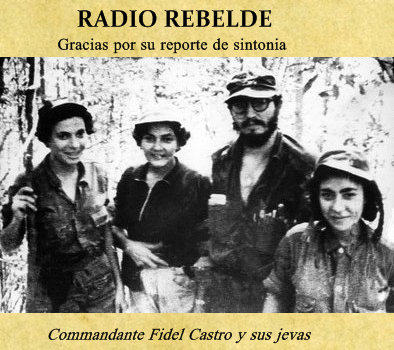guerrilla Babe QSLs

|
|
From the Elmer Dixon collection |
Che Guevara, that master of guerrilla warfare, knew that psychology can be even more important in winning a guerrilla war than the weapons carried by the fighters themselves. That's why he spearheaded Radio Rebelde, one of the most successful clandestine broadcasters in radio history. Che also knew that part of the battle is to demoralize government soldiers. Like all Latin American guerrilla movements, Castro's rebels had women fighters. And the government army, like all Latin American armies of the day, was a man's world. How better to demoralize the opposition by flaunting the fact that the guerrillas had women in their camps! And, that is how the guerrilla babe QSLs began.
In early 1958, Radio Rebelde began sending out this QSL, featuring Castro y sus Jevas (literally, Castro and his Babes). The implication was that there were so many babes in the guerrilla camp, that the head guy had three. Of course, since Radio Rebelde was still broadcasting from the mountains, they didn't send out the QSLs themselves. The cards were issued by the movement's political office in Miami. But, copies of the QSLs made their way back to Cuba and to the hands of government soldiers.
Several other Latin American guerrilla groups issued guerrilla babe QSLs during the 1960s and 1970s. In May and June, 1979, Radio Sandino issued some very risque cards which, along with listings of several carefully-selected Managua houses of ill-repute, made their way to soldiers in the Somoza dictatorship's army. The cards enticed hundreds of soldiers to visit the Managua establishments and the resulting cases of venereal disease significantly reduced the effectiveness of the army.

|
|
From the Omy Goshen collection |
By all accounts, the all-time classic guerrilla babe QSL is this one, titled Love on the Battlefield, issued by El Salvador's Radio Venceremos in the mid-1980s. Instead of appealing to base desires, this card successfully created a yearning for romance. What young man couldn't picture himself in the mountains with this beautiful young woman by his side? Desperate for a close relationship, dozens of Salvadoran soldiers deserted to the guerrillas after seeing this card. And, by focusing on the romantic aspects of being a guerrilla, the card also appealed to young women, who left the cities to find a virile young hunk to fight beside. It was a Harlequin novel in real life.

